Venezuelan opposition pushes for big turnout in protest vote
Symbolic vote comes two weeks before President Maduro plans to rewrite the country's constitution
Winston Churchill made the telling observation that socialism can provide equality, but it is the equality of misery; while capitalism offers the inequality of prosperity and plenty. History has reinforced this belief many times. Now we are living through this nightmare yet again in a place that the late Venezuelan President Hugo Chavez called a socialist paradise.
Venezuela is the opposite of a paradise today. It is going through a dark and dangerous period, with an unprecedented level of desperation. The socialists have taken an economy that was among the most successful in South America and reduced it to an unrecognizable facsimile of itself. Admittedly, class distinctions are gone, just as food and medicine have disappeared from store shelves.
Severe food shortages have caused 75 percent of Venezuelans to lose an average of 19 pounds in weight and 82 percent of households are living in poverty, according to a study by three of the nation’s universities. Scarcity has led to violence and violence on the streets has been accompanied by a government crackdown.
Millions of Venezuelans have signaled their disapproval of President Nicolas Maduro, Chavez’s successor, and thousands have taken to the streets in anti-Maduro demonstrations over more than three months. The opposition to Maduro announced Saturday it will hold a two-day national strike this week, following a 24-hour general strike last week that was joined by millions.
However, despite overwhelming disapproval, Maduro is intent on consolidating his power by holding a special election scheduled for July 30 to elect a new constituent assembly that would rewrite the nation’s constitution – presumably to give Maduro dictatorial authority.
Opposition leader Leopoldo Lopez, recently released from prison and under house arrest, has been engaged in mobilizing voter opposition to Maduro’s power grab. Whether a protest movement can gain momentum remains to be seen. But tensions have soared with runaway inflation that doubles the price of food each week.
Most Venezuelans are persuaded that Maduro’s plan to convene a constituent assembly is undemocratic, notwithstanding the government’s position that it is the basis for freedom.
Recognizing the obvious, President Trump said in a statement last week that the “strong and courageous actions (of the Venezuelan people) continue to be ignored by a bad leader who dreams of becoming a dictator.” President Trump added: “The United States will not stand by as Venezuela crumbles. If the Maduro regime imposes its Constituent Assembly on July 30, the United States will take strong and swift economic actions.” However, economic sanctions imposed by the U.S. on Venezuela in 2015 have had little practical effect.
Imposing new sanctions against Venezuela will play into Maduro’s hands, since he will claim a U.S. economic war against his people and blow the whistle against the specter of interventionism. Responding to the threat of U.S. sanctions, Maduro’s government said in a statement: “The government of the United States is used to humiliating other nations in its international relations” and called on the world to understand “the magnitude of the brutal threat contained in this (President Trump’s) imperial statement.”
Alas, that is precisely the anti-American language often used in Latin America and for which there is a rich history. The “caudillo” (dictator) idea has not died; it has been transmogrified into leaders who campaign on democratic reform and govern as authoritarians.
When Venezuela operated on a partially free market arrangement, its oil reserves generated great wealth, admittedly distributed inequitably. In the 1970’s Venezuela was going through an economic take-off stage. A friend, who managed the National Oil Company, would wax lyrical about the economic opportunities then emerging. In some ways, this was like Argentina before the ruling Peron family, when wealth made that nation the sixth-richest in the world.
Venezuela was on the same path prior to Chavez. But the leader’s dedication to socialism and his masters in Havana and Moscow led him to nationalize key industries, reward his friends, drive wealthy citizens from the country and engage in coercive measures against the opposition. Secret police jailed dissidents without trial, a practice that continues to this very day. In fact, it is estimated that more than 90 people have been killed and more than 3,000 arrested since the recent street demonstrations against Maduro began.
It is ironic that as the ugly face of Venezuelan socialism is evident, Americans in increasing numbers believe socialism can address what ails our own economy. Sen. Bernie Sanders rose to prominence in the last presidential election by arguing that socialism can provide free health care and free education.
What Sanders didn’t point out is how expensive “free” services are. Nor did he suggest that if you want to see socialism at work you should visit Venezuela. Yes, here is an undeviating case of imposed equality and the horror of human misery.
As Winston Churchill so aptly put it in 1948: “Socialism is the philosophy of failure, the creed of ignorance and the gospel of envy.”

